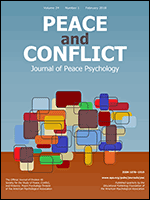Rinker, J., & Lawler, J. (2018). Trauma as a Collective Disease and Root Cause of Protracted Social Conflict. Peace and Conflict: Journal of Peace Psychology, 24(2), 150–164.
Abstract
Collective historical trauma underlies much of the social conflict in the world today. This article places the processes of collective trauma at the center of both conflict analysis and transformation. As a collaborative analysis between a clinical psychologist and a peace and conflict studies scholar-practitioner, the authors open a trans-disciplinary research agenda on trauma as a collective disease and underaddressed root cause of protracted social conflict. Applying the Strategies for Trauma Awareness and Resilience (STAR) Model, an innovative model developed by Eastern Mennonite University and Church World Service following the September 11, 2001 attacks, the authors explore collective trauma as a cyclical process and use two case studies involving interactions between officers of the state and citizens from marginalized communities in Palestine-Israel and the United States. The authors aim to bring to the fore of their respective disciplines a critical discussion of the social dynamics, societal costs, and potential solidarities of privileging collective trauma. (APA PsycInfo Database Record (c) 2019 APA, all rights reserved)

